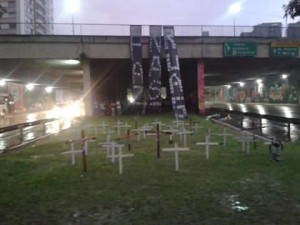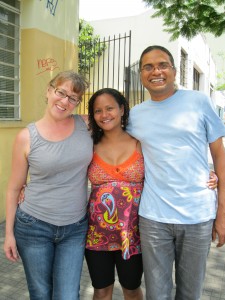Then Joseph her husband, being a just man, and not willing to make her a public example, decided to put her away privately. (Matthew 1:19)
Igor has been looking a little discouraged lately. He has been looking for a job for three months now and so far nothing has come up. He tries to put on a strong exterior but we can see that he is a little disappointed. The local economy is not doing well and most places are not hiring. Looking for a job is hard itself, but for Igor there is an additional burden and obstacle. He confessed that he always feels self-conscious of his past and thinks that everyone around him is scrutinizing him. Whenever someone does not respond positively to him, he feels as if that they are judging him based on his past. This comes from years of being taught to believe that he would amount to nothing but a thief. Now, he finds it hard to navigate out of this mindset.
Bit by bit Igor is sharing his life experiences with us. Recently he talked about his long stay in the juvenile detention center. He said that physical abuse was routine even for some minor infractions. All the boys were accustomed to it and he does not even feel any rancor towards the guards. He believed that they did what they did to maintain order in the center. However, the guards that he found hard to forgive were the ones who abused him verbally. They constantly told him that he was nothing but a criminal and there was no hope for him. He said that no matter how much he tried he just cannot seem to erase the memories of these words. Hurtful words remain embedded in his soul whereas physical injuries heal and eventually disappear.
Igor also shared that he had a younger brother. Soon after Igor left for the streets when he was seven, his younger brother followed suit. However, he did not last long. He was terrified of the streets. He did not like the sub-culture of the streets. He detested sniffing glue and was fearful of any criminal activities. He left the streets within the week and went to his aunt’s house and never set foot again in the streets. He went to school and got a job when he was sixteen. He worked in a small business that was relatively successful. His boss took a special liking to him and trusted him with large amount of money. Unfortunately, he and a group of friends decided to rob his boss. They tied him up and took off with a large sum of money in a car. The police eventually picked up on their trail and a long drawn out car chase ensued. Tragically, it ended with all of them being shot and killed by the police. None of them were armed and his boss was not hurt. According to Igor, the whole event was caught on national news. I asked Igor whether his brother was influenced by his friends to rob his boss and to my surprise, Igor believed that it was the other way round. I asked him why would his brother who was once afraid of any criminal activities decide to engage in robbery. His answer was simple and heartbreaking. Igor told me that when you grow in a certain neighborhood, you are told all your life that the only way out is through crime. When his brother saw how much money his boss had, he decided to take the easy way out of poverty. Unfortunately, he paid a high price for a small sum of cash.
As part of our weekly time with Igor, we are reading the gospel of Matthew together. When we came to the part where Joseph discovered Mary’s pregnancy. We spoke about Joseph being just and because of his sense of justice, he wanted to save his fiancé any possible harm or danger by trying to breaking up the engagement secretly. Another man would reacted differently. However, it was this sense of justice that helped him hear and receive the Word from the Angel about Mary’s true status. The conclusion we arrived at was that being a just person prepares one to see and understand what God is doing in one’s life. Then Igor asked a difficult question. He wanted to know what does it mean to be just person.
I was silenced by his question. Igor was serious about becoming a righteous person and he wanted to know if this is something that he could learn and what he must do to acquire this understanding. When he saw that I was struggling to answer his question, he decided to help me out and rephrase the question. He wanted to know what was righteous living. This did not alleviate the situation. However, I am grateful that he asked these difficult questions because they helped me to examine my own life as well. It seems like it is easier to say what is unrighteous living. Pointing out what is wrong is easier than showing how to do something the right way. After a few moments of silence and pondering, I told him that for me living a just life means living in harmony with who God has made me to be. I will be the first to admit that this does not really make it clearer. I decided to try again. Not because I wanted to show that I knew the answer; I wanted to answer the question for my own sake. I decided to be honest and said that for me living a just life has to do with my own pursuit of happiness. I believe that being a just person is intrinsically linked with one’s own personal happiness. It is also synonymous with discovering who God has created me to be.
I realized that to tell Igor that he needs to change his life is meaningless if we cannot say what this change is supposed to be. I cannot teach Igor something that I don’t understand myself. However, I did say that it has to do with discovering who God has made us to be. It is a personal journey where he needs to discover God’s voice speaking to him. Igor has heard many voices in his life. These voices brought him to the streets and to the brink of desperation. Even though we cannot teach Igor to be a just person, perhaps he can see through our lives that there exists another voice that speaks to our innermost being and points the way to true happiness. We hope that our lives will inspire Igor to seek this voice out for himself.



